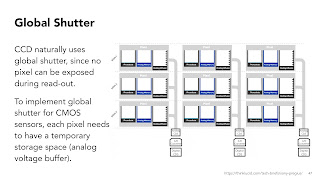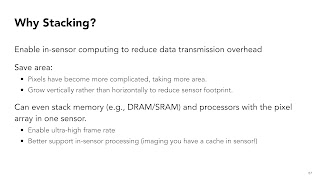These lecture slides by Prof. Yuhao Zhu at U. Rochester are a great first introduction to how an image sensor works. A few selected slides are shown below. For the full slide deck visit: https://www.cs.rochester.edu/courses/572/fall2022/decks/lect10-sensor-basics.pdf












On p.10, it's quite strange to relate the photoelectric effects to image sensors
ReplyDeleteif you don't know, the first image sensor is based on photoelectric effect = Image dissector.
DeleteWell, on the RHS of p.10 there shows a Canon image sensor for digital cameras, and on the LHS it shows the photoelectric effect cartoon. Even if this is for computer science students, there are surely better ways to explain.
DeleteQuestion of semantics? The confusion could come from the fact the external photoelectric effect is often referred to as the photoelectric effect (cf 1887 Hertz' observation and 1905 Einstein' theoretical explanation), when incident photon energy is greater than a metallic cathod work function resulting in electron extraction. Internal photoelectric effect which is at work in image sensors photodiodes is most of the time covered by photovoltaic / photoconductive effects designations.
ReplyDeleteWhat really disturbs me is the explanation about the PPD in global shutter mode. The PPD is NOT RESET at all, and for sure not to the power supply VDD. There are many more errors on the sheets, but the PPD reset is the biggest one.
ReplyDeleteDepends on at voltage pinning happens.
DeleteNo a correctly designed PPD should be fully depleted when the stored charge is transferred out, in this case PPD can be seen as reset after the readout. So not really a mistake here.
Delete